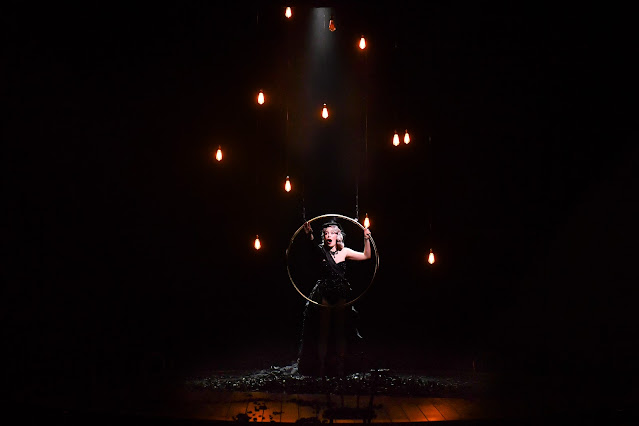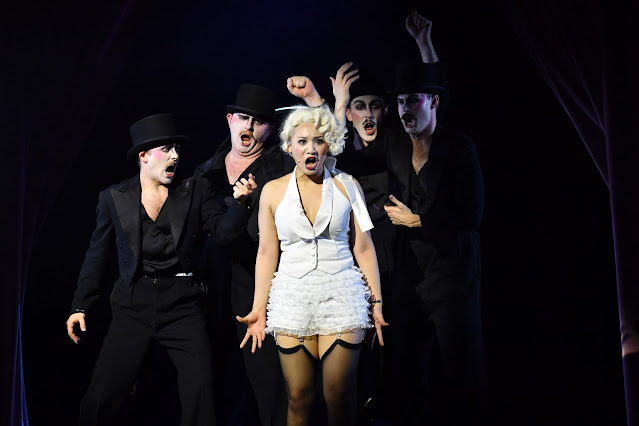 |
| Ravel: L’heure espagnole – Alexandria Moon, Edward Birchinall, Benedict Munden, Marcus Swietlicki (part) – Royal College of Music (Photo: Chris Christodoulou) |
Britten: Les illuminations, Weill: Chansons des Quais; Ravel: L’heure espagnole; Georgia Melville, Cecilia Zhang, Alexandria Moon, Marcus Swietlicki, Benedict Munden, Sam Hird, Edward Birchinall, director: Ella Marchment, conductor: Michael Rosewell, Royal College of Music Opera Studio; Britten Theatre, Royal College of Music
Reviewed 27 November 2024
Three contrasting French texted pieces, drawn together in an evening of vibrant, thought-provoking performances which very much created an evening about the female gaze
The latest opera offering from the Royal College of Music is a triple bill presented by their Opera Studio which, in some ways, could be seen as an intriguingly imaginative answer to the question ‘what do you programme with Ravel’s L’heure espagnole?’. Director Ella Marchment has put together a triple bill of French-texted works, adding two works that are not strictly operatic and are not by French composers, Britten’s Les illuminations and Chansons des Quais, a 2017 sequence of Kurt Weill’s music created out of his incidental music for Jacques Deval’s play, Marie Galante, originally written in 1934.
The evening was largely double cast, and we caught the performance on 27 November 2024 at the Britten Theatre, when the Royal College of Music Opera Studio presented Britten’s Les illuminations with soprano Georgia Melville, Weill’s Chansons des Quais with Cecilia Zhang, and Ravel’s L’heure espagnole with Alexandria Moon as Concepcion, plus Marcus Swietlicki, Benedict Munden, Sam Hird and Edward Birchinall. Michael Rosewell conducted, Ella Marchment directed with designs by Cordelia Chisholm. Adam Haigh was the movement director and assistant director for Chansons de Quais.
 |
| Britten: Les illuminations – Georgia Melville – Royal College of Music (Photo: Chris Christodoulou) |
We began with Britten. Just Georgia Melville on stage in a top hat and elaborate showgirl-esque costume with a train, sitting in a suspended hoop at the centre of a circular stage. Around this, chairs. Marchment’s staging was about an older actress/singer figure inspired by Mistinguett remembering her past, her admirers and her lovers. This Mistinguett type figure linked all three works, though the concept was very much an ideation, the timing works because Mistinguett was long lived, but she was an actress who sang and, as far as I know, never went near Ravel or Weill.
This is not the first time that I have seen Les illuminations staged, I caught Frederick Ashton’s 1950 ballet on the work (created for New York City Ballet) when it was revived by the Royal Ballet in 1981. Marchment’s staging worked better, frankly, because she kept closer to the idea of the single female protagonist. There was a detailed scenario, but I abandoned that and concentrated on Georgia Melville’s vibrant and compelling performance. She brought all manner of detail and vivid emotion to the work. Her voice seemed to have dramatic promise but with a degree of control which meant we got all of Britten’s intricate delicacy too. And whilst Marchment’s scenario might have seemed to detailed, too high-concept, in performance it clearly helped Melville give this fully rounded, compelling performance.
She interacted with ghosts of her ex-lovers and ex-admirers (played by eight men, I think the male singers from both casts). And another theme came out, one that resonated in each of the works, the way men treat women they profess to admire. This wasn’t a ‘feminist’ reading, whatever that might be, but it was very much an evening about the female gaze.
In the pit, Rosewell and the strings of the Royal College of Music Opera Orchestra were on vibrant form, the opening fanfares were vivid yet not too strident and throughout there was this balance of timbres and manners, complementing Melville’s stunning performance.
 |
| Weill: Chansons des Quais – Cecilia Zhang, Sam Hird, Benedict Munden, Marcus Swietlicki, Edward Birchinall – Royal College of Music (Photo: Chris Christodoulou) |
There is no plot to Chansons des Quais, the songs Weill wrote for Marie Galante are haunting and memorable, but incidental to whatever the action was (about a prostitute marooned in Panama, evidently). The music for Marie Galante includes an instrumental tango-habanera that Weill would subsequently put words too, Youkali, so this was included too. And why not.
The early 1930s were a complex and troubling period for Weill. We tend to see the twin focuses of his career being Weimar Germany and Broadway, but for a short period it was much more and the music from Marie Galante is indicative of that. In March 1933, he fled Nazi Germany; in April 1933, The Threepenny Opera opened on Broadway and closed after 13 performances, to mixed reviews; The Seven Deadly Sins, his last collaboration with Brecht, premiered in Paris in 1933; in 1934 he completed his last purely orchestral work, his Symphony No. 2, conducted in Amsterdam and New York by Bruno Walter; in Paris he wrote music for Marie Galante; he travelled to London for his operetta, Der Kuhandel in 1935. Finally, in 1935 he moved to New York, and never left.
For this staging, we were very much on the stage, in the cabaret, with the focus being on Cecilia Zhang. She was dressed in trousers, with four admirers/supporters dressed in frou-frou frocks and high heels but definitely men, though by the end these had effectively swapped. Again, the essential drama was about the interaction between the woman and the men, their admiration for her and their ill-treatment of her, and her ultimate survival. Marchment had provided a similarly detailed scenario, but Weill’s songs are so memorable that I simply listened and watched. There are different ways of interpreting the Weill of this period, the music was written for singing actors but requires musical skill and it can be sung classically. Zhang sang them, but she was miked so we had a more actorly voice and she was fully alert to the words. Trivial they might be, but they are important.
I have nothing but admiration for the four men, Marcus Swietlicki, Benedict Munden, Sam Hird and Edward Bichinall, who managed to be compelling, fascinating and threatening by turns, all the time in high heels and doing amazing drag-esque routines (movement by Adam Haigh). That Zhang kept our attention when she was performing says a lot for her stage presence, and the staging was very much about the dramatic interaction between them. The older Mistinguett figure from the first part (Georgia Melville) returned at the end in a gesture which might have seemed contrived but which Melville and Zhang made rather satisfying.
I have no idea whose orchestrations we were listening to, the Chansons des Quais is described as having music by Kurt Weill, but was conceived by Kim H Kwalke and edited by John Baxindine. We had a small ensemble, with three saxophones and plenty of wind, taking us back to Berlin in the sound world. It worked, and Rosewell and the musicians did Weill proud.
The evening concluded with Ravel’s L’heure espagnole. We could probably have done without Georgia Melville’s older Mistinquett mooning around the stage at the opening, ‘remembering’, but essentially this was an imaginative and vivid staging of the work. Marchment gave it point, the piece is about men’s treatment of a woman after all, but here Alexandria Moon’s Concepcion had real agency, yet Marchment remembered that this was a comedy. Everything was done in slightly stylised, over done manner, but there was a light touch. We laughed and were moved.
Moon’s Concepcion was a strong figure, one who repeatedly broke the fourth wall and drew us in. Yes, she might be scheming to cheat on her husband, but she made us feel sympathetic and amused. Moon’s performance was vibrant and pointed, yet always she seemed to combine strength with flexibility of line. As her ultimate love object, the muleteer Sam Hird was charmingly gauche and dead pan, completely unknowing when it came to his physical charms and of the men in Concepcion’s life, the only one to treat her as a person, not an object.
 |
| Ravel: L’heure espagnole – Marcus Swietlicki – Royal College of Music (Photo: Chris Christodoulou) |
Benedict Munden as Torquemada the clockmaker cut an elegant, rather pernickety figure and wisely Munden did not try to act old, but simply was too absorbed in his job. The poet Gonsalve (Marcus Swietlicki) on the other hand was too absorbed in his poetry, and Swietlicki had great fun with Gonsalve’s lyrical outpourings. Edward Birchinall’s Don Inigo was very much a commedia dell’arte type figure, concerned with his image. Marchment displayed her familiar flair when it came do dealing with the complexities of men climbing into clocks, being carried in them and getting stuck. The results were suitably hilarious.
In the pit, Michael Rosewell drew a wonderfully diaphanous texture from the orchestra, the opening prelude very much drew us into this story-telling world and throughout Rosewell and his young players surrounded the singers in a fluid and imaginative web.
Whatever the dramaturgy of the triple bill, this evening worked because Michael Rosewell and Ella Marchment drew finely complex, and highly involving performances from all concerned. An evening of compelling theatre.
The blog is free, but I’d be delighted if you were to show your appreciation by buying me a coffee.
Elsewhere on this blog
- Sight and sound: Holst’s The Planets reimagined for the Father Willis organ at Salisbury Cathedral by John Challenger – record review
- Melodies without Borders: two Turkish musicians mixing lyric melancholy with 19th century bravura – concert review
- Letter from Florida: Sarasota Opera Concert Performance, The Music of Giuseppe Verdi – concert review
- The music is there, we only have to open our eyes: pianist Alexandra Dariescu on 100 Nutcrackers, advocating for women composers & a new direction at the Leeds International Piano Competition – interview
- If you go down to the woods: a gender-fluid witch & an oppressive religious sect, Hänsel und Gretel from Royal Academy Opera – opera review
- Au cimetièrère de Montmartre: Julien Van Mellaerts & Alphonse Cemin in an imaginative trawl thro’ the denizens of a Paris cemetery – concert review
- Letter from Florida: New World Symphony Veterans’ Day Concert, A World War II Journey with Lidiya Yankovskaya & Emily Magee – concert review
- Glorious performances from Rhian Lois and Thomas Atkins lift ENO’s new production of Donizetti’s The Elixir of Love – opera review
- Life enhancing: the Orchestra of the Age of Enlightenment in Bach’s Brandenburg Concertos – concert review
- By some strange piece of magic, it works: Dancing Queen from Asya Fateyeva & Lautten Compagney Berlin mixes Rameau with the songs of ABBA – record review
- Home









